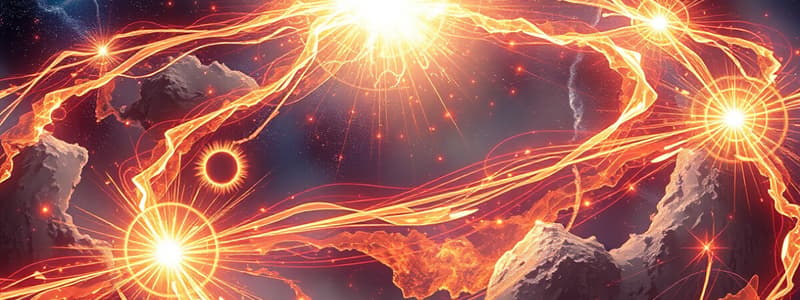Podcast
Questions and Answers
The ______ force governs planetary motion.
The ______ force governs planetary motion.
gravitational
The equation F=ma describes Newton's ______ law of motion.
The equation F=ma describes Newton's ______ law of motion.
second
Kinetic energy is calculated as KE = 1/2 mv², where m stands for ______.
Kinetic energy is calculated as KE = 1/2 mv², where m stands for ______.
mass
The ______ law states that entropy of an isolated system always increases.
The ______ law states that entropy of an isolated system always increases.
Mechanical waves require a ______ to travel through.
Mechanical waves require a ______ to travel through.
Flashcards are hidden until you start studying
Study Notes
Key Concepts in Physics
Fundamental Forces
- Gravitational Force: Attraction between masses; governs planetary motion.
- Electromagnetic Force: Interaction between charged particles; responsible for electricity and magnetism.
- Weak Nuclear Force: Responsible for radioactive decay and nuclear reactions.
- Strong Nuclear Force: Binds protons and neutrons in atomic nuclei.
Laws of Motion (Newton's Laws)
- First Law (Inertia): An object at rest remains at rest, and an object in motion remains in motion unless acted upon by a net force.
- Second Law (F=ma): The acceleration of an object is directly proportional to the net force acting on it and inversely proportional to its mass.
- Third Law (Action-Reaction): For every action, there is an equal and opposite reaction.
Energy
- Kinetic Energy (KE): Energy of motion, calculated as KE = 1/2 mv² (m = mass, v = velocity).
- Potential Energy (PE): Stored energy based on position, calculated as PE = mgh (m = mass, g = acceleration due to gravity, h = height).
- Conservation of Energy: Energy cannot be created or destroyed, only transformed from one form to another.
Waves and Oscillations
- Wave Properties:
- Wavelength: Distance between successive crests or troughs.
- Frequency: Number of waves passing a point per second.
- Amplitude: Height of the wave from the rest position.
- Types of Waves:
- Mechanical Waves: Require a medium (e.g., sound waves).
- Electromagnetic Waves: Do not require a medium (e.g., light waves).
Thermodynamics
- Zeroth Law: If two systems are in thermal equilibrium with a third system, they are in equilibrium with each other.
- First Law: Energy cannot be created or destroyed (conservation of energy).
- Second Law: Entropy of an isolated system always increases; heat flows from hot to cold.
- Third Law: As temperature approaches absolute zero, the entropy of a perfect crystal approaches zero.
Relativity
- Special Relativity:
- Time dilation: Time moves slower at higher speeds.
- Length contraction: Objects appear shorter in the direction of motion as they approach light speed.
- General Relativity:
- Gravity is the curvature of spacetime caused by mass.
Quantum Mechanics
- Wave-Particle Duality: Particles exhibit both wave-like and particle-like properties.
- Uncertainty Principle: It is impossible to know both the position and momentum of a particle with absolute certainty.
- Quantum States: Describes the probability of finding a particle in a particular state.
Atomic Structure
- Atoms: Basic units of matter, consisting of protons, neutrons, and electrons.
- Nucleus: Center of the atom, containing protons and neutrons.
- Electrons: Negatively charged particles orbiting the nucleus.
Electricity and Magnetism
- Ohm's Law: V = IR (V = voltage, I = current, R = resistance).
- Magnetic Fields: Produced by moving electric charges; can influence other charges and currents.
- Electromagnetic Induction: Generation of electric current by changing magnetic fields.
Fluid Dynamics
- Bernoulli's Principle: In a flowing fluid, an increase in velocity occurs simultaneously with a decrease in pressure.
- Archimedes' Principle: A body submerged in fluid experiences a buoyant force equal to the weight of the fluid it displaces.
These notes summarize foundational concepts in physics and can serve as a quick reference for the subject.
Fundamental Forces
- Gravitational Force: Attraction between masses influencing planetary motion.
- Electromagnetic Force: Interaction among charged particles, responsible for electricity and magnetism.
- Weak Nuclear Force: Governs radioactive decay and nuclear interactions.
- Strong Nuclear Force: Binds protons and neutrons within atomic nuclei.
Laws of Motion (Newton's Laws)
- First Law (Inertia): An object remains at rest or in uniform motion unless influenced by a net external force.
- Second Law (F=ma): Acceleration is directly proportional to net force and inversely proportional to mass.
- Third Law (Action-Reaction): Every action has an equal and opposite reaction.
Energy
- Kinetic Energy (KE): Energy due to motion, calculated as KE = 1/2 mv², where m is mass and v is velocity.
- Potential Energy (PE): Stored energy based on an object’s height, computed as PE = mgh (m = mass, g = gravitational acceleration, h = height).
- Conservation of Energy: Total energy remains constant, transforming between forms without being created or destroyed.
Waves and Oscillations
- Wave Properties:
- Wavelength: Distance between successive wave crests or troughs.
- Frequency: Number of waves that pass a point per second.
- Amplitude: Maximum height of the wave from its rest position.
- Types of Waves:
- Mechanical Waves: Require a medium for propagation (e.g., sound waves).
- Electromagnetic Waves: Can propagate through a vacuum (e.g., light waves).
Thermodynamics
- Zeroth Law: If two systems are in thermal equilibrium with a third, they are also in equilibrium with each other.
- First Law: Energy cannot be created or destroyed, affirming the principle of conservation.
- Second Law: Entropy in an isolated system tends to increase; heat flows from hotter to cooler areas.
- Third Law: As temperature nears absolute zero, the entropy of a perfect crystal approaches zero.
Relativity
- Special Relativity:
- Time dilation: Time is observed to slow down at higher velocities.
- Length contraction: Objects appear compressed in their motion direction as they approach the speed of light.
- General Relativity: Describes gravity as the curvature of spacetime instigated by mass.
Quantum Mechanics
- Wave-Particle Duality: Particles display characteristics of both waves and discrete particles.
- Uncertainty Principle: Inability to precisely determine both a particle's position and momentum simultaneously.
- Quantum States: Describe the likelihood of a particle existing in a specified state.
Atomic Structure
- Atoms: Fundamental units of matter, comprised of protons, neutrons, and electrons.
- Nucleus: Center of the atom that contains protons and neutrons.
- Electrons: Negatively charged particles that orbit the atomic nucleus.
Electricity and Magnetism
- Ohm's Law: Expresses relationship as V = IR (V = voltage, I = current, R = resistance).
- Magnetic Fields: Created by moving electric charges, impacting other charges and currents.
- Electromagnetic Induction: The generation of electric currents through changing magnetic fields.
Fluid Dynamics
- Bernoulli's Principle: In a fluid flow, velocity increases correspondingly with a decrease in pressure.
- Archimedes' Principle: A submerged body experiences buoyant force equal to the weight of the fluid it displaces.
Studying That Suits You
Use AI to generate personalized quizzes and flashcards to suit your learning preferences.




